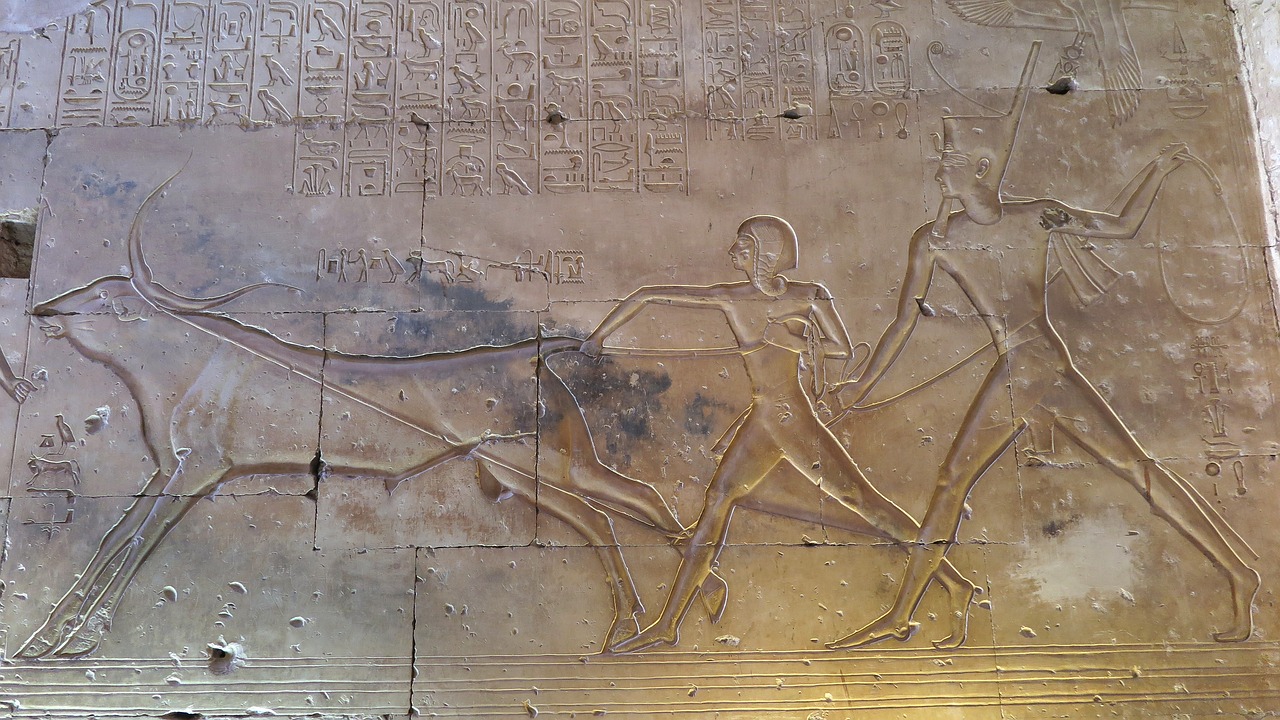Delving Into Metaphysics: Unlocking the Secrets of Existence
Have you ever found yourself gazing up at the night sky, pondering the vastness of the universe and your place within it? Or perhaps you've sat quietly, contemplating the meaning of life and what it truly means to exist. These profound questions are at the heart of metaphysics, a branch of philosophy that dives deep into the fundamental nature of reality. It's like peering behind the curtain of existence, trying to uncover the secrets that lie beneath the surface of our everyday experiences. In this article, we will embark on a journey through the intricate world of metaphysics, exploring its key concepts, historical perspectives, and the ongoing debates that shape our understanding of reality.
Metaphysics is not just a fancy term thrown around in philosophical circles; it is a serious inquiry into the nature of the universe. At its core, metaphysics seeks to answer questions about being, existence, and the very fabric of the cosmos. Imagine it as the ultimate quest for understanding, where philosophers and thinkers attempt to unravel the mysteries of life itself. What does it mean to exist? What is the nature of reality? Are there things beyond what we can see and measure? These questions are the essence of metaphysical inquiry, inviting us to explore the unknown and challenge our perceptions of reality.
The evolution of metaphysical thought is a fascinating tale that stretches back to ancient civilizations. From the early musings of Greek philosophers to the complex theories of modern thinkers, metaphysics has been shaped by cultural contexts and historical events. By understanding these perspectives, we can appreciate how metaphysical ideas have evolved and influenced our current understanding of existence. It's like tracing the roots of a grand tree, where each branch represents a different school of thought, contributing to the rich tapestry of metaphysical inquiry.
When we think of metaphysics, we often find ourselves returning to the ancient Greeks. Philosophers such as Plato and Aristotle laid the groundwork for metaphysical inquiry, exploring concepts that still resonate today. Their ideas about forms, substance, and causality opened the door to countless debates and discussions. Imagine Plato's theory of forms as a blueprint for reality, suggesting that the tangible world we see is merely a shadow of a higher, more perfect existence. On the other hand, Aristotle's substance theory provided a solid foundation for understanding the essence of things, emphasizing the importance of causality and potentiality in our grasp of reality.
Plato proposed that the non-material realm of abstract forms represents the most accurate reality, contrasting sharply with our physical world. This notion has sparked extensive debate regarding the nature of existence and knowledge. Think of it like a perfect recipe that exists in an ideal world, while the dishes we create in our kitchens are mere approximations. Plato's theory invites us to question the validity of our perceptions and consider the possibility of a more profound reality that lies beyond our immediate experiences.
In contrast, Aristotle introduced the concept of substance as the essence of things, providing a framework for understanding reality that is both practical and profound. His insights into causality and potentiality remain central to metaphysical discussions today. Aristotle's approach is akin to a master builder, focusing on the materials and structures that compose our world, allowing us to grasp the connections and relationships that define existence. By examining the essence of things, we can better understand how they interact and contribute to the larger tapestry of reality.
Fast forward to today, and we find ourselves in the midst of modern metaphysical debates that tackle issues like the nature of time, space, and identity. These discussions often intersect with advancements in science and technology, prompting new questions about existence and reality. It's like standing at the crossroads of philosophy and science, where each field informs and challenges the other. As we delve deeper into these debates, we uncover layers of complexity that enrich our understanding of the universe.
Several fundamental concepts underpin metaphysical inquiry, including ontology, cosmology, and epistemology. Each of these concepts plays a crucial role in shaping our understanding of existence and the nature of reality. They are like the building blocks of metaphysical thought, providing a framework for exploration and discussion.
Ontology focuses on the nature of being and existence, exploring questions about what entities exist and the relationships between them. It’s like peeling back the layers of an onion, revealing the intricate connections that make up the fabric of reality. What does it mean to exist? What kinds of things can be said to exist? These questions are central to ontological inquiry, inviting us to consider the very essence of existence.
Cosmology examines the origins and structure of the universe, delving into metaphysical questions about time, space, and the nature of the cosmos. It bridges the gap between philosophy and scientific inquiry, allowing us to ponder the mysteries of the universe. Think of cosmology as the ultimate map of existence, guiding us through the vast expanse of the cosmos and helping us make sense of our place within it.
The relationship between metaphysics and science is complex, as both fields seek to understand reality in their own ways. While science relies on empirical evidence and observable phenomena, metaphysics explores the foundational principles that underpin scientific theories. It’s like two sides of the same coin, where each perspective enriches our understanding of existence.
Metaphysics provides a philosophical framework for interpreting scientific findings, addressing questions about the nature of laws, causation, and the limits of scientific explanation. It encourages us to think critically about the assumptions that underlie scientific inquiry, pushing the boundaries of our understanding.
Critics argue that metaphysical claims are often unfalsifiable and lack empirical support, leading to debates about the validity and relevance of metaphysics in an increasingly scientific world. This tension invites us to engage in thoughtful discussions about the nature of knowledge and the limits of our understanding, reminding us that the quest for truth is an ongoing journey.
- What is the main focus of metaphysics? Metaphysics primarily focuses on the fundamental nature of reality, exploring concepts such as being, existence, and the universe.
- How has metaphysical thought evolved over time? Metaphysical thought has evolved through various philosophical traditions, with significant contributions from ancient Greek philosophers like Plato and Aristotle.
- What are some key concepts in metaphysics? Key concepts in metaphysics include ontology (the study of being), cosmology (understanding the universe), and epistemology (the study of knowledge).
- How does metaphysics relate to science? Metaphysics and science both seek to understand reality, but they approach it from different angles—science relies on empirical evidence, while metaphysics explores foundational principles.

What is Metaphysics?
Metaphysics is a fascinating branch of philosophy that dives deep into the fundamental nature of reality. Imagine it as the grand stage where the most profound questions about existence, being, and the universe play out. It’s like peeling back the layers of an onion, revealing deeper truths about what lies beneath the surface of our everyday experiences. At its core, metaphysics seeks to answer questions that often puzzle even the brightest minds: What is the nature of existence? What does it mean to be? What is the universe made of, and what are its underlying principles?
This philosophical inquiry extends beyond the physical realm, encouraging us to explore concepts that are not easily observable or measurable. While science provides us with tools to understand the physical world, metaphysics invites us to ponder the “why” behind those observations. For instance, while a scientist might study the behavior of particles, a metaphysician might ask, “What does it mean for something to exist at all?”
To put it simply, metaphysics is the ultimate quest for understanding the essence of reality. It encompasses various subfields, including ontology (the study of being), cosmology (the study of the universe), and epistemology (the study of knowledge). Each of these areas contributes to our overall comprehension of existence and the universe, forming a rich tapestry of inquiry that has captivated thinkers for centuries.
As we delve into the world of metaphysics, we encounter a multitude of perspectives and debates that have evolved over time. From the ancient philosophers of Greece to contemporary thinkers, the discourse around metaphysics has shaped our understanding of reality and continues to influence modern philosophy and science. It's a dynamic field that challenges our perceptions and invites us to question our assumptions about the world.
In summary, metaphysics is not just an abstract concept; it is a vital aspect of human thought that encourages us to explore the depths of existence and reality. As we embark on this journey, let’s keep our minds open to the myriad possibilities that lie beyond the tangible, and embrace the wonder of what it means to exist.
- What are the main branches of metaphysics? The main branches include ontology, cosmology, and epistemology, each focusing on different aspects of existence and knowledge.
- How does metaphysics differ from science? While science relies on empirical evidence and observation, metaphysics explores the foundational principles and concepts that underlie scientific theories.
- Can metaphysical claims be proven? Critics argue that many metaphysical claims are unfalsifiable, leading to debates about their validity in a scientific context.

Historical Perspectives on Metaphysics
Metaphysics has a rich and varied history, serving as a cornerstone of philosophical inquiry across cultures and epochs. From the ancient musings of Greek philosophers to the modern debates that challenge our understanding of existence, the evolution of metaphysical thought reflects humanity's quest to grasp the essence of reality. The journey of metaphysics is akin to a tapestry, woven with threads of different philosophies, cultural contexts, and pivotal thinkers who have shaped our understanding of existence.
In ancient Greece, metaphysics began to take form as a distinct field of study. Philosophers like Plato and Aristotle introduced foundational concepts that continue to resonate today. Plato’s idealism posited that the physical world is merely a shadow of a higher reality comprised of abstract forms. This idea sparked debates that challenge the very nature of what we consider 'real.' Aristotle, on the other hand, grounded metaphysics in the tangible world, emphasizing the importance of substance and causality in understanding existence. Their contrasting views laid the groundwork for centuries of philosophical discussion.
As we move through history, we encounter a myriad of perspectives. The medieval period saw metaphysics intertwined with theology, where thinkers like Aquinas sought to reconcile faith with reason. This era raised questions about the existence of God and the nature of the soul, which were pivotal in shaping metaphysical discourse. The Renaissance brought a renewed interest in humanism and empirical inquiry, leading to metaphysical debates that questioned the validity of traditional beliefs.
Fast forward to the Enlightenment, and we see metaphysics grappling with the rise of science. Philosophers like Descartes and Kant challenged existing paradigms, introducing ideas about perception and the limits of human understanding. Kant’s critical philosophy, for instance, argued that our knowledge is shaped by our experiences, which in turn influences how we perceive reality. This period marked a significant shift, as metaphysics began to incorporate scientific principles, leading to a more nuanced understanding of existence.
In the 20th century, metaphysics faced significant challenges from logical positivism and empiricism, which questioned the validity of metaphysical claims. Critics argued that many metaphysical assertions were unfalsifiable, leading to a decline in interest among some philosophers. However, this did not extinguish the flame of metaphysical inquiry. Contemporary thinkers continue to explore profound questions about the nature of reality, identity, and existence, often intersecting with advancements in science and technology.
To better understand the historical perspectives on metaphysics, consider the following table that highlights key philosophers and their contributions:
| Philosopher | Key Contribution | Era |
|---|---|---|
| Plato | Theory of Forms | Ancient Greece |
| Aristotle | Substance Theory | Ancient Greece |
| Aquinas | Integration of Faith and Reason | Medieval Period |
| Descartes | Cogito, ergo sum (I think, therefore I am) | Enlightenment |
| Kant | Transcendental Idealism | Enlightenment |
In conclusion, the historical perspectives on metaphysics reveal a dynamic interplay of ideas that have evolved over centuries. Each philosopher has contributed uniquely to our understanding of existence, challenging us to think deeply about the nature of reality. As we continue to explore metaphysical questions, we not only honor the legacy of these thinkers but also enrich our own understanding of the universe and our place within it.
- What is the main focus of metaphysics? Metaphysics primarily examines the fundamental nature of reality, including concepts of being, existence, and the universe.
- How did ancient Greek philosophers influence metaphysics? Ancient Greek philosophers like Plato and Aristotle established foundational concepts that continue to influence metaphysical discussions today.
- What role does metaphysics play in science? Metaphysics provides a philosophical framework for interpreting scientific findings, addressing questions about laws, causation, and the limits of scientific explanation.
- Are metaphysical claims considered valid in modern philosophy? While some critics argue that metaphysical claims are unfalsifiable, contemporary philosophers continue to engage with these questions, reflecting an ongoing interest in the nature of existence.

Ancient Greek Contributions
When we think about the roots of metaphysics, we often find ourselves journeying back to the vibrant intellectual landscape of ancient Greece. This era was a crucible of philosophical thought, where some of the most influential minds laid the groundwork for metaphysical inquiry. Think of it as the launching pad for our quest to understand existence, reality, and the universe itself. Plato and Aristotle stand out as titans of this intellectual movement, each contributing unique perspectives that continue to resonate in contemporary debates.
Plato, for instance, introduced the Theory of Forms, a concept that posits the existence of non-material abstract forms as the most accurate reality. Imagine a world where the physical objects we see are merely shadows of a higher truth—this is the essence of Plato’s thought. His idea suggests that the true essence of things exists beyond our sensory experiences, sparking a rich dialogue about the nature of knowledge and existence. It raises questions like: Are we merely perceiving illusions, or is there a deeper truth that we can grasp?
On the other hand, we have Aristotle, whose contributions are equally profound. He introduced the idea of substance, which refers to the essence of things that make them what they are. Aristotle's framework for understanding reality revolves around the concepts of causality and potentiality. For him, everything in the universe has a purpose and a reason for being, which adds another layer to our understanding of existence. His thoughts can be visualized as a vast interconnected web, where each entity plays a crucial role in the grand tapestry of reality.
To better understand the contrast between these two philosophical giants, let’s summarize their key contributions in the following table:
| Philosopher | Key Contribution | Core Idea |
|---|---|---|
| Plato | Theory of Forms | Non-material abstract forms represent the most accurate reality. |
| Aristotle | Substance Theory | Substance is the essence of things, with a focus on causality and potentiality. |
The debates sparked by these ancient thinkers have evolved but remain relevant in today’s discussions about metaphysics. Their ideas not only shaped the trajectory of philosophical thought but also influenced various fields such as science, theology, and ethics. As we delve deeper into metaphysical inquiries, we continuously grapple with the questions posed by these ancient philosophers. Are we merely products of our physical world, or is there a higher reality that we strive to understand? The echoes of Plato and Aristotle remind us that the quest for understanding is as timeless as existence itself.

Plato's Theory of Forms
Plato's Theory of Forms is a cornerstone of his philosophical thought and offers a profound perspective on the nature of reality. According to Plato, the physical world we perceive through our senses is merely a shadow of a higher, more real realm of existence—the realm of Forms. These Forms, or Ideas, are abstract, perfect, unchanging concepts or ideals that transcend time and space. For instance, while we may encounter many different chairs in our lives, they all share the common essence of "chairness," which exists as a perfect Form in this higher realm.
To illustrate this idea, consider the following analogy: imagine a beautiful painting of a tree. The painting captures the essence of a tree, but it is not a tree itself. Similarly, the physical objects we encounter are like paintings, mere representations of the true Forms that exist beyond our sensory experience. This distinction raises intriguing questions about knowledge and reality. If the physical world is just a reflection of these Forms, how can we attain true knowledge? Plato argues that through philosophical reasoning and dialectic, we can gain insight into the nature of these Forms and thus understand the true essence of reality.
Plato's Theory of Forms also emphasizes the importance of the philosopher's role in society. He believed that those who have grasped the nature of the Forms are best equipped to guide others toward understanding. This idea is famously encapsulated in his allegory of the cave, where prisoners mistake shadows on the wall for reality until one escapes and discovers the world outside, filled with true Forms. This allegory serves as a metaphor for the philosopher's journey from ignorance to enlightenment, highlighting the transformative power of knowledge.
However, Plato's theory has not been without its critics. Many philosophers have challenged the existence of these abstract Forms, questioning how they relate to the physical objects we encounter. For example, Aristotle, a student of Plato, argued against the separation of Forms and physical objects, suggesting that Forms exist within the objects themselves rather than in a separate realm. This debate continues to be a significant point of contention in metaphysical discussions, illustrating how Plato's ideas have sparked ongoing inquiry into the nature of existence.
In summary, Plato's Theory of Forms invites us to reconsider our understanding of reality and existence. It challenges us to look beyond the physical world and seek the underlying truths that shape our understanding of the universe. By engaging with these profound concepts, we can unlock deeper insights into the nature of being and the essence of knowledge.
- What are Plato's Forms? Plato's Forms are perfect, abstract ideals that exist in a non-physical realm, serving as the true essence of all things in our physical world.
- How does the Theory of Forms relate to knowledge? Plato believed that true knowledge comes from understanding these Forms, as they represent the ultimate reality beyond mere sensory experience.
- What is the allegory of the cave? The allegory of the cave is a philosophical metaphor that illustrates the difference between the world of appearances and the world of reality, emphasizing the philosopher's journey toward enlightenment.
- Why did Aristotle criticize Plato's Theory of Forms? Aristotle argued that Forms do not exist separately from physical objects but rather are intrinsic to them, leading to a different understanding of reality.

Aristotle's Substance Theory
Aristotle's Substance Theory is a cornerstone of his philosophical framework, providing a comprehensive understanding of reality through the lens of substance. He defined substance as that which exists independently and is the essence of things. In simpler terms, think of substance as the "stuff" that makes up everything around us. It's akin to the foundation of a house; without a solid base, the structure cannot stand. For Aristotle, substances are not just objects, but they also encompass the qualities and traits that define them.
According to Aristotle, substances can be categorized into two main types: primary substances and secondary substances. Primary substances refer to individual entities, like a specific tree or a particular person, while secondary substances refer to the species or genera that those primary substances belong to, such as "tree" or "human." This distinction is crucial because it helps us understand how individual entities relate to broader categories of existence.
Aristotle emphasized that substances have both matter and form. Matter refers to the physical components that make up a substance, while form is the essence or the defining characteristics that give a substance its identity. For instance, consider a clay statue. The clay itself represents the matter, while the shape and design of the statue embody its form. This interplay between matter and form is what allows substances to change while retaining their identity. Imagine a caterpillar transforming into a butterfly; although it undergoes a significant change, it remains the same organism at its core.
Moreover, Aristotle introduced the concept of causality within his Substance Theory. He proposed four types of causes that explain why a substance exists in its particular form:
- Material Cause: What something is made of (e.g., marble for a statue).
- Formal Cause: The design or blueprint of a substance (e.g., the shape of the statue).
- Efficient Cause: The agent or process that brings a substance into being (e.g., the sculptor).
- Final Cause: The purpose or function of a substance (e.g., the statue's role as art).
This framework of causality not only helps us understand individual substances but also the broader dynamics of change and existence in the universe. Aristotle's insights into substance have had a lasting impact on metaphysical discussions, influencing thinkers throughout history and continuing to spark debates today.
- What is the significance of Aristotle's Substance Theory?
Aristotle's Substance Theory is significant because it provides a foundational understanding of existence, categorizing entities and explaining their properties, which has influenced both philosophy and science.
- How does Aristotle differentiate between primary and secondary substances?
Primary substances are individual entities, like a specific dog or tree, while secondary substances are the categories or species to which these entities belong, such as "dog" or "tree."
- What role do matter and form play in Substance Theory?
Matter refers to the physical substance of an entity, while form refers to its essential characteristics. Together, they define what a substance is and how it can change while maintaining its identity.

Modern Metaphysical Debates
In the vibrant landscape of contemporary philosophy, are not just academic exercises; they are crucial discussions that resonate with our understanding of existence in a rapidly evolving world. These debates tackle a range of issues that challenge our preconceived notions about reality, identity, and the fabric of the universe. One of the most intriguing aspects of modern metaphysics is its intersection with advancements in science and technology. As we uncover the mysteries of the universe through scientific inquiry, new metaphysical questions emerge, prompting us to rethink what we know.
For instance, consider the nature of time. Is time an absolute entity that exists independently of us, or is it merely a construct of human perception? Philosophers and scientists alike grapple with these questions, leading to fascinating discussions about the flow of time, its direction, and its implications for our understanding of existence. Some argue that time is linear, while others propose that it may be cyclical or even an illusion. This debate not only engages metaphysicians but also physicists, as theories such as relativity challenge our conventional understanding of time.
Another hot topic is the nature of identity. What does it mean to be the same person over time? This question raises profound implications for ethics, law, and personal responsibility. The famous Ship of Theseus paradox, which asks if a ship that has had all its components replaced remains the same ship, serves as a starting point for discussions on identity. In light of modern neuroscience, which reveals the malleability of memory and consciousness, the stakes of this debate become even higher. Are we merely the sum of our memories, or is there something more enduring that constitutes our identity?
Additionally, the concept of existence itself is under scrutiny. With the rise of virtual realities and digital identities, what does it mean to exist? Are digital beings or avatars considered 'real'? This question challenges our understanding of being and raises ethical considerations about how we interact with these new forms of existence. Philosophers are now tasked with redefining existence in an increasingly digital world, where the lines between the physical and virtual are blurred.
Modern metaphysical debates also delve into the nature of consciousness. What is consciousness, and how does it relate to the physical brain? This inquiry is not just philosophical; it has significant implications for psychology, artificial intelligence, and even ethics. Theories range from viewing consciousness as a fundamental aspect of the universe to considering it a byproduct of complex biological processes. Each perspective offers unique insights and challenges, pushing our understanding of what it means to be human.
These debates are not merely theoretical; they impact our daily lives and the choices we make. As we navigate a world filled with technological advancements and philosophical quandaries, it becomes increasingly important to engage with these modern metaphysical questions. They invite us to explore the depths of our existence and to ponder the very nature of reality itself.
- What is the main focus of modern metaphysical debates? Modern metaphysical debates primarily focus on the nature of time, identity, existence, and consciousness, especially in light of scientific advancements.
- How do modern debates differ from historical metaphysical discussions? While historical discussions often centered on foundational concepts, modern debates engage with contemporary issues such as digital existence and the implications of neuroscience.
- Why are metaphysical debates important today? These debates help us understand the implications of technological advancements on our perception of reality and existence, influencing ethical considerations and personal identity.

Key Concepts in Metaphysics
When diving into the vast ocean of metaphysics, you'll encounter several key concepts that serve as the bedrock of this philosophical inquiry. These concepts help us navigate the intricate web of existence, reality, and our understanding of the universe. Three of the most significant areas of exploration are ontology, cosmology, and epistemology. Each of these fields offers unique insights and perspectives that challenge our everyday assumptions about what is real and what it means to exist.
First up is ontology, the study of being and existence. Imagine standing in front of a mirror and questioning not just your reflection but the very essence of who you are. Ontology digs deep into these questions, examining what entities exist in our universe and the relationships that bind them. It’s like peeling an onion—each layer reveals more about the nature of reality, pushing us to consider not just what exists, but how different forms of existence interact with one another. For instance, consider the distinction between physical objects, abstract concepts, and even the existence of potential entities. These layers of understanding can lead to profound realizations about the fabric of our reality.
Next, we have cosmology, which is all about understanding the universe—its origins, structure, and the laws that govern it. Think of cosmology as the grand narrative of existence, where we seek to answer questions like, "How did the universe begin?" and "What is the nature of time and space?" Cosmology doesn't just stop at the physical universe; it also delves into the metaphysical implications of our findings. For example, if we accept the Big Bang theory, what does that say about the nature of time? Is time linear, or could it be cyclical? These inquiries bridge the gap between philosophy and science, pushing us to rethink our place in the cosmos.
Finally, we arrive at epistemology, the study of knowledge and belief. It’s one thing to ponder existence, but how do we know what we know? Epistemology challenges us to examine the sources of our beliefs and the justification behind them. It asks critical questions such as: What constitutes knowledge? Can we truly know anything, or is all knowledge inherently uncertain? In a world flooded with information, epistemology acts as a guiding compass, helping us discern truth from falsehood, and understanding from mere opinion.
| Concept | Description |
|---|---|
| Ontology | The study of being and existence, exploring what entities exist and their relationships. |
| Cosmology | The examination of the universe's origins, structure, and laws, bridging philosophy and science. |
| Epistemology | The study of knowledge and belief, questioning the sources and justification of what we know. |
In summary, these key concepts in metaphysics—ontology, cosmology, and epistemology—form a triad of inquiry that challenges us to think critically about our existence and the universe around us. They invite us to explore profound questions and engage in debates that have persisted through centuries of philosophical thought. As we continue to ponder these concepts, we not only deepen our understanding of metaphysics but also enrich our appreciation of the mysteries of life itself.
- What is metaphysics? Metaphysics is a branch of philosophy that investigates the fundamental nature of reality, existence, and the universe.
- Why is ontology important? Ontology helps us understand what entities exist and how they relate, providing a framework for exploring the nature of reality.
- How does cosmology relate to metaphysics? Cosmology examines the universe's origins and structure, raising metaphysical questions about time, space, and existence.
- What role does epistemology play in metaphysics? Epistemology questions the nature of knowledge and belief, helping us discern truth and understand how we know what we know.

Ontology: The Study of Being
Ontology is often described as the branch of metaphysics that delves into the nature of being and existence. But what does that really mean? Imagine walking into a vast library filled with countless books, each representing different entities or concepts in the universe. Ontology is like the librarian, helping you categorize, understand, and explore what these entities are, how they relate to one another, and what it truly means to "be." It's a fascinating journey that not only questions the existence of things but also probes deeper into the essence of those things.
At its core, ontology raises profound questions such as: What does it mean to exist? Are there different kinds of existence? For instance, consider the distinction between abstract entities like numbers and concrete objects like trees. Ontologists seek to understand these differences and categorize entities in a way that makes sense within our understanding of reality. This exploration often leads to further inquiries about the relationships between these entities. For example, how does the existence of one entity depend on another? Is there a hierarchy of existence?
One of the significant contributions to ontology comes from the distinction between existential categories. Here are some key categories often discussed:
- Concrete entities: These are objects that occupy space and time, such as a chair or a person.
- Abstract entities: These include concepts that do not have a physical presence, like love or justice.
- Universal entities: These are properties or qualities that can be shared among different entities, such as the color red.
- Particular entities: These refer to individual instances of a category, like a specific apple on a tree.
Understanding these categories not only enriches our comprehension of existence but also influences various fields, including science, theology, and even artificial intelligence. For instance, in AI, ontological frameworks help in creating databases that understand and categorize information. This leads to more effective communication between machines and humans, as they can better grasp the nuances of existence.
Moreover, ontology doesn't just remain a theoretical exercise; it has practical implications. Consider the field of medicine. The classification of diseases, symptoms, and treatments relies heavily on ontological principles. By understanding the relationships between different medical entities, healthcare professionals can provide better care and develop more effective treatments. This highlights how ontology is not just about philosophical musings but is deeply intertwined with the fabric of our everyday lives.
In conclusion, ontology is a rich and intricate study that invites us to ponder the very essence of existence. It challenges us to consider not just what exists but how and why it exists. As we continue to explore these questions, we find that ontology serves as a crucial bridge between our understanding of reality and the myriad entities that populate it.
- What is the primary focus of ontology?
Ontology primarily focuses on the nature of being and existence, exploring what entities exist and how they relate to one another. - How does ontology differ from other branches of philosophy?
While other branches of philosophy may focus on ethics, aesthetics, or logic, ontology specifically addresses questions about existence and the nature of reality. - Can ontology be applied in practical fields?
Yes, ontology has practical applications in fields such as medicine, artificial intelligence, and information science, where categorizing and understanding entities is crucial.

Cosmology: Understanding the Universe
Cosmology is a fascinating branch of metaphysics that delves deep into the origins, structure, and ultimate fate of the universe. It’s like trying to piece together a cosmic puzzle, where each piece represents a fundamental aspect of reality. Have you ever looked up at the night sky and wondered what lies beyond those twinkling stars? Cosmology seeks to answer those profound questions, exploring not just the physical universe we can see, but also the underlying principles that govern it.
At its core, cosmology grapples with some of the biggest questions humanity has ever faced. For instance, what caused the universe to exist? How did it all begin? The Big Bang theory is one of the most widely accepted explanations, suggesting that the universe expanded from an extremely hot and dense state approximately 13.8 billion years ago. However, cosmology doesn't stop there; it also investigates the nature of time and space, probing whether they are absolute or relative concepts.
One of the intriguing aspects of cosmology is its interplay with other fields of study, particularly physics. For example, the concept of dark matter and dark energy has become a hot topic in both cosmological and physical discussions. To illustrate, consider the following table that summarizes some of the key components of the universe:
| Component | Description |
|---|---|
| Dark Matter | A form of matter that does not emit light or energy, making it invisible and detectable only through its gravitational effects. |
| Dark Energy | A mysterious force that is driving the accelerated expansion of the universe. |
| Cosmic Microwave Background | Radiation left over from the Big Bang, providing a snapshot of the infant universe. |
The exploration of these components not only enhances our understanding of the universe but also raises further questions about existence itself. Are we alone in this vast cosmos? What does it mean to exist in a universe that is constantly expanding? These questions are not just philosophical; they resonate with the scientific community as well, leading to ongoing research and debate.
In summary, cosmology is not merely a study of celestial phenomena; it is a profound inquiry into the very nature of existence. By examining the universe's structure and origins, cosmologists aim to uncover the fundamental truths that shape our reality. So, the next time you gaze at the stars, remember that each flicker of light is a reminder of the mysteries that cosmology seeks to unravel.
- What is the difference between cosmology and astronomy?
While astronomy focuses on the observation and study of celestial bodies, cosmology encompasses a broader inquiry into the universe's origins, structure, and fate.
- Is dark matter real?
Yes, dark matter is widely accepted in the scientific community due to its gravitational effects on visible matter, even though it has yet to be directly observed.
- Can the universe end?
Yes, cosmologists theorize various scenarios for the end of the universe, including the Big Freeze, Big Crunch, or Big Rip, each based on different aspects of cosmic expansion and energy.

Metaphysics and Science
When we think about metaphysics and science, it’s like trying to fit two pieces of a puzzle that don’t always seem to match. On one hand, science is all about empirical evidence—the tangible, measurable stuff that we can see and test. On the other hand, metaphysics dives deep into the foundational principles that underpin our understanding of reality, often venturing into realms that science cannot easily quantify. This intersection raises intriguing questions: Can metaphysics inform scientific inquiry? Or does it simply muddy the waters of what we can observe and measure?
One way to look at their relationship is through the lens of philosophical frameworks. Metaphysics provides the groundwork upon which scientific theories are built. For instance, consider the laws of physics. These laws are not just arbitrary; they stem from deeper metaphysical assumptions about the nature of existence, causation, and the universe itself. Without the metaphysical underpinnings, scientific findings might lack the context needed to understand their broader implications.
However, this doesn’t mean that metaphysics is without its challenges. Critics often argue that many metaphysical claims are unfalsifiable, meaning they can’t be tested or disproven through scientific methods. This leads to a significant point of contention: Is metaphysics relevant in a world increasingly dominated by science? To answer this, let’s explore some key aspects of how these two fields interact:
| Aspect | Metaphysics | Science |
|---|---|---|
| Objective | Explores fundamental questions about existence and reality | Seeks to explain the natural world through observation and experimentation |
| Methodology | Philosophical reasoning and abstract thought | Empirical research and scientific method |
| Nature of Claims | Often speculative and theoretical | Testable and falsifiable |
| Examples | Questions about the nature of time, space, and identity | Experiments in physics, biology, and chemistry |
This table highlights some of the fundamental differences between metaphysics and science, yet it also illustrates how they can complement one another. For example, while science can describe the mechanics of a black hole, metaphysics asks what it means for something to exist in such a state. This kind of inquiry can lead to profound insights that enrich our understanding of the universe.
Ultimately, the relationship between metaphysics and science is not one of conflict but rather a dynamic interplay. Each field challenges the other to refine its questions and broaden its horizons. As we continue to explore the mysteries of existence, it’s essential to recognize that both metaphysical inquiry and scientific investigation offer valuable perspectives on the nature of reality. So, the next time you ponder a profound question about existence, remember that both science and metaphysics have a role to play in unraveling the secrets of the universe.
- What is the main difference between metaphysics and science? Metaphysics explores the fundamental nature of reality and existence, while science focuses on empirical evidence and the natural world.
- Can metaphysics and science coexist? Yes, they can complement each other, as metaphysics provides philosophical context for scientific findings.
- Why are metaphysical claims often considered unfalsifiable? Many metaphysical claims cannot be tested or disproven through empirical methods, leading to debates about their validity.
- How does metaphysics inform scientific inquiry? Metaphysics helps frame the foundational principles that underlie scientific theories, influencing how we interpret scientific data.

The Role of Metaphysics in Scientific Inquiry
Metaphysics plays a crucial role in shaping our understanding of scientific inquiry by providing a philosophical backdrop against which scientific discoveries can be interpreted. While science is grounded in empirical evidence and observable phenomena, metaphysics delves into the underlying principles that govern these phenomena. In essence, metaphysics asks the "why" behind the "how," offering explanations that often lie beyond the reach of scientific experimentation.
For instance, consider the nature of causality. Science can demonstrate that one event follows another, but metaphysics probes deeper into the essence of causation itself. What does it mean for one thing to cause another? This inquiry can lead to profound implications for our understanding of time, space, and the universe at large. Metaphysical questions can illuminate the assumptions that scientists make when they formulate hypotheses and conduct experiments.
Moreover, metaphysics helps to clarify the concepts that are foundational to scientific theories. Take the concept of "laws of nature," for example. Scientists often refer to these laws as if they are inherent features of the universe. However, metaphysical inquiry challenges us to consider whether these laws are merely descriptive or if they have a prescriptive power that dictates how the universe operates.
To illustrate this relationship further, here’s a simple table that outlines some key metaphysical questions and their relevance to scientific inquiry:
| Metaphysical Question | Scientific Relevance |
|---|---|
| What is causation? | Understanding cause and effect is essential for forming scientific hypotheses. |
| What is time? | Time is a fundamental aspect of physics; metaphysical interpretations can influence theories of relativity. |
| What exists? | Defining what constitutes 'existence' can affect scientific classifications and categories. |
However, the relationship between metaphysics and science is not without its challenges. Critics often argue that metaphysical claims can be unfalsifiable, meaning they cannot be tested or disproven through empirical means. This raises questions about the relevance of metaphysics in a world increasingly dominated by scientific inquiry. Yet, dismissing metaphysics entirely would be a mistake, as it encourages scientists to think critically about their own assumptions and the implications of their findings.
In conclusion, the role of metaphysics in scientific inquiry is multifaceted. It offers a lens through which we can interpret scientific data, challenges us to think critically about foundational concepts, and fosters a deeper understanding of the universe. As we continue to explore the mysteries of existence, the interplay between metaphysics and science will undoubtedly remain a vital area of inquiry.
- What is the difference between metaphysics and science?
Metaphysics explores the fundamental nature of reality and existence, while science focuses on empirical evidence and observable phenomena. - Can metaphysical claims be tested?
Many metaphysical claims are considered unfalsifiable, meaning they cannot be tested or disproven through scientific methods. - Why is metaphysics important for scientific inquiry?
Metaphysics helps clarify foundational concepts, challenges assumptions, and provides a philosophical framework for interpreting scientific findings.

Challenges to Metaphysical Claims
Metaphysics, while a fascinating field of inquiry, faces a myriad of challenges that often put its claims under the microscope. One of the most significant challenges is the notion of **falsifiability**. Critics argue that many metaphysical claims are inherently unfalsifiable, meaning they cannot be tested or disproven through empirical observation. This raises the question: if a claim cannot be tested, can it truly be considered knowledge? For instance, arguments about the existence of a higher reality or the essence of being often fall into this category, leading skeptics to dismiss them as mere speculation.
Moreover, the rapid advancements in **science** pose another challenge. As scientific theories evolve, they frequently provide explanations for phenomena that were once the domain of metaphysical inquiry. Take, for example, the concept of time. Historically, metaphysics explored time as an abstract entity, but with the development of **theory of relativity**, our understanding of time has shifted dramatically. Now, questions about whether time is linear or cyclical are often addressed through scientific lenses rather than metaphysical ones.
Additionally, there is the issue of **relevance**. In a world increasingly driven by scientific discovery and technological advancement, some argue that metaphysics has lost its place. Is it still necessary to ponder existential questions when we have concrete scientific explanations? This skepticism towards metaphysics has led to a divide in philosophical circles, with some philosophers advocating for a return to metaphysical inquiry, while others believe it should be relegated to the background.
Despite these challenges, metaphysics remains a vital part of philosophical discourse. It encourages us to ask profound questions about existence, reality, and our place in the universe. While critics may point out its limitations, the exploration of metaphysical ideas can lead to new insights and a deeper understanding of the human experience. In many ways, metaphysics acts like a compass, guiding our thoughts as we navigate the complexities of life, even if it sometimes leads us into uncharted territory.
- What is metaphysics? Metaphysics is a branch of philosophy that investigates the fundamental nature of reality, including concepts like being, existence, and the universe.
- Why is metaphysics important? It helps us explore profound questions about existence and reality, providing insights that can influence our understanding of the world.
- How does metaphysics relate to science? While science relies on empirical evidence, metaphysics delves into the foundational principles that underlie scientific theories.
- What are some common criticisms of metaphysics? Critics argue that many metaphysical claims are unfalsifiable and lack empirical support, leading to debates about their validity.
Frequently Asked Questions
- What is the main focus of metaphysics?
Metaphysics primarily examines the fundamental nature of reality, exploring concepts such as existence, being, and the universe itself. It seeks to answer profound questions about what lies beyond the physical realm, diving deep into the essence of existence.
- How has metaphysical thought evolved over time?
The evolution of metaphysical thought can be traced through various philosophical traditions, from ancient Greece to modern philosophy. Each era brings unique perspectives and debates that shape our understanding of the universe and its underlying principles.
- What are some key concepts in metaphysics?
Some fundamental concepts in metaphysics include ontology (the study of being), cosmology (the study of the universe's origins and structure), and epistemology (the study of knowledge). Each of these areas plays a crucial role in shaping our understanding of reality.
- How does metaphysics relate to science?
The relationship between metaphysics and science is intricate. While science relies on empirical evidence and experimentation, metaphysics provides a philosophical framework for interpreting scientific findings and addressing foundational questions about laws, causation, and the limits of scientific inquiry.
- What are some criticisms of metaphysical claims?
Critics often argue that metaphysical claims can be unfalsifiable and lack empirical support, leading to debates about their validity and relevance in a world increasingly dominated by scientific inquiry. This tension raises important questions about the role of metaphysics in understanding existence.
- Why is understanding metaphysics important?
Understanding metaphysics is crucial because it helps us grapple with the big questions of existence and reality. It provides a deeper insight into the nature of the universe, our place within it, and the principles that govern our understanding of life itself.
- Can metaphysical questions be answered definitively?
Many metaphysical questions remain open to interpretation and debate, as they often transcend empirical evidence and delve into philosophical speculation. This ongoing inquiry is what keeps metaphysical discussions vibrant and relevant.



















